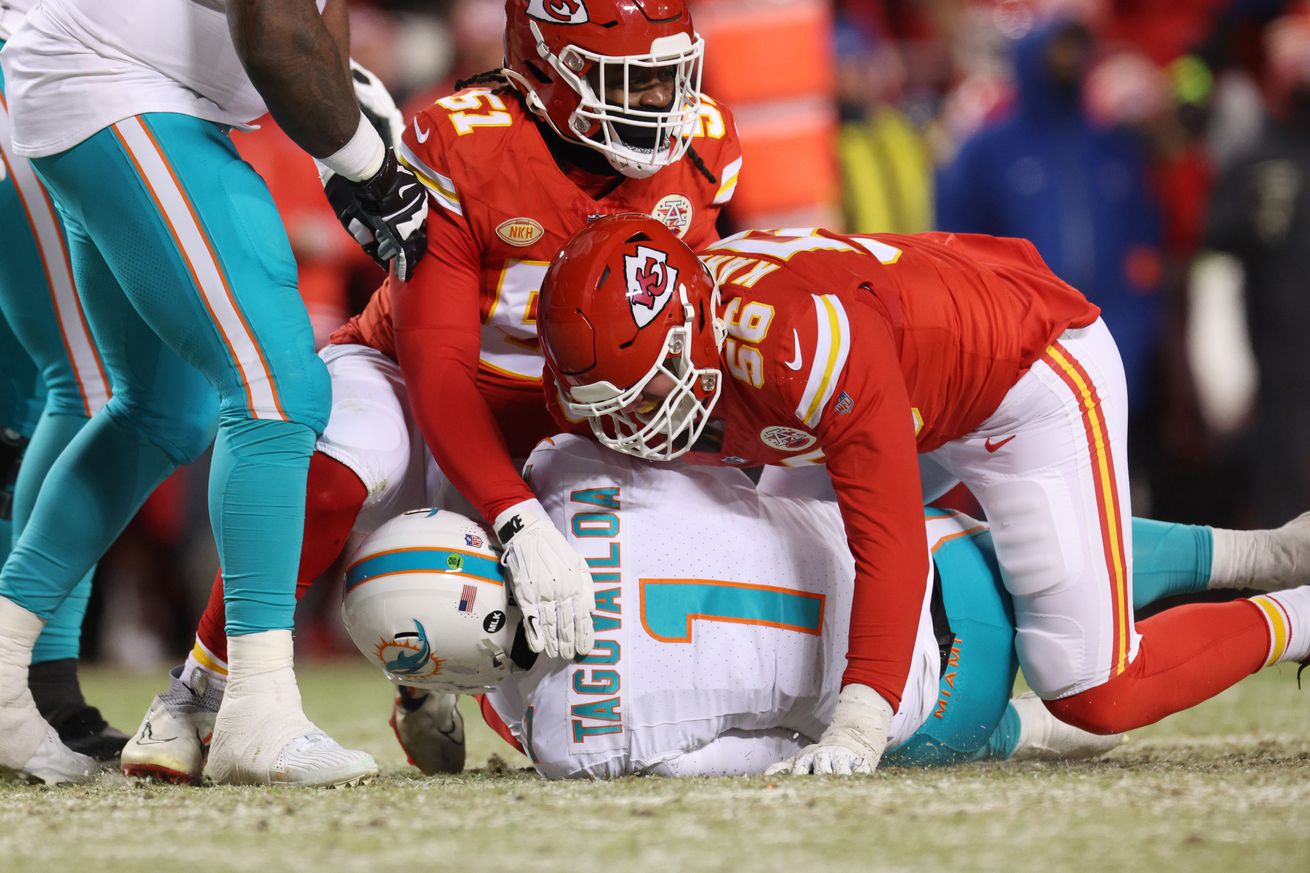
Photo by Jamie Squire/Getty Images
The Dolphins had the opportunity to prove they’re legit against the Chiefs. They did the opposite.
The Wild Card game against the Kansas City Chiefs on Saturday was not just an opportunity for the Miami Dolphins to advance to the next round of the NFL playoffs. It also was a chance to alter a narrative that has surrounded the team all year: that it bought its playoff ticket on victories over bad teams.
Following their 26-7 defeat in freezing Kansas City, little has changed. If anything, the game showed to a national audience that the Dolphins indeed were the league’s ultimate paper tiger this season.
It was the latest indignity in a swift fall from grace for the team of head coach Mike McDaniel.
On Christmas Eve, the Dolphins looked like one of the hottest teams in the league. Hosting the Dallas Cowboys in a battle of 10-4 teams, they celebrated a 22-20 victory to show once and for all that they were not just a legitimate playoff contender but ready to take on any team in football. Or so it seemed, at least.
What followed the next two week, however, created some serious doubts about Miami’s ability to compete against the NFL’s top dogs — something they themselves did not appear to be, after all.
First came a 56-19 beatdown at the hands of the Baltimore Ravens that ended the Dolphins’ hopes of earning the No. 1 seed and a first-round bye in the AFC playoffs. A week later, with the AFC East title on the line, they were beaten again. Their 21-14 loss versus the Buffalo Bills dashed any aspirations of the club’s first division title in 15 years. And not just that: it also forced the Dolphins to go on the road in the first round of the playoffs, against none other than the reigning world champions.
Two weeks after their win over the Cowboys, the Dolphins were in for another tough ride. And was it ever that.
Miami quickly fell behind 10-0, and while a 51-yard touchdown pass from Tua Tagovailoa to ex-Chief Tyreek Hill gave the club some life it was not enough. Kansas City controlled the game on both sides of the ball, seemingly never running any risk of a comeback. All the while, the points kept mounting. 13-7. 16-7. 19-7. And when an Isiah Pacheco run made it 27-7 in favor of the home team, the proverbial fat lady had sung.
The Dolphins’ powerful offense finished the game gaining just 13 first downs and 264 yards, going a mere 1-of-12 on third down, and turning the ball over a combined four times: once via an interception, and thrice on downs.
“We fell very short of our goals,” said McDaniel after the game. “We have very strong expectations for ourselves. One of the reasons a lot of people don’t put themselves out there and hold those expectations is because when you fall short of them it’s emotional, it’s gut-wrenching.”
The circumstances did not not do the Dolphins any favors on Saturday. The game was one of the coldest in NFL history, with the temperature at kickoff measured at -4° F with a wind chill of -27 — a challenge for any team, especially one used to playing in the warm South Florida conditions.
The Chiefs also played arguably their most complete game in weeks. Their defense provided relentless pressure, while their offense moved the ball more efficiently than it had at times over the second half of the regular season.
Add the fact that the Chiefs were shorthanded, especially on defense. Besides missing edge defenders Jaelan Phillips and Bradley Chubb as well as linebacker Jerome Baker on injured reserve, they also had to deactivate defensive backs Jevon Holland and Xavien Howard due to knee and foot injuries, respectively.
The Dolphins were limping toward the finish line, yes. But even when they were at full strength earlier in the season they had a hard time against playoff-caliber teams.
Of their seven games against teams that ended up making the playoffs, Miami lost all but one (the aforementioned 22-20 victory over Dallas in December). And they didn’t just lose: the combined scoring differential in those games was -110. As pointed out by Ringer’s Sheil Kapadia, only the Washington Commanders had a worse point differential versus postseason-bound opponents:
Dolphins vs. playoff teams: 1-6 with a -110 point differential. Only the Commanders had a worse point differential against playoff teams.
Miami offense scored 1 TD on its final 16 offensive possessions of the season. Brutal performance when the stakes were highest.
— Sheil Kapadia (@SheilKapadia) January 14, 2024
Meanwhile, the combined winning percentage of the teams the Dolphins did manage to beat en route to their 11-5 record was just .358.
The Dolphins simply did not play consistently competitive football against the best teams in the league. Going one-and-done in the playoffs was therefore the logical way for their season to find its disappointing end.
Such is the fate of the paper tigers.

Must See
-


American Football
/ 3 hours agoLIV Golf: “Ur such a pu**y;” Anthony Kim eviscerates Brandel Chamblee
Anthony Kim took to social media and blasted Golf Channel analyst Brandel Chamblee, amid...
By -


American Football
/ 3 hours agoYouTube Golf star George Bryan ‘melts on golf course’ amid PGA Tour start
Photo by Tracy Wilcox/PGA TOUR via Getty Images YouTuber George Bryan received an invitation...
By -


American Football
/ 8 hours ago5 NFL matchups we’d like to see on Christmas Day
Photo by Ezra Shaw/Getty Images The NFL Schedule Release is coming and here are...
By





